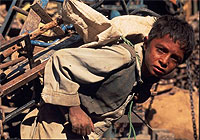By Farida Ayari
This year’s World Day against Child Labour, celebrated on 12 June, highlighted the continuing challenges to eliminating the worst forms of child labour, with a focus on exploitation of girls. Here is a related story.

Bent over by the weight of the scrap metal he is carrying on his back, an Afghan boy walks in the town of Torkham, near the Khyber Pass, to cross into neighbouring Pakistan.

Because of the leniency shown by customs officials, children are often employed for cross-border trade between Afghanistan and Pakistan. (Photos: UNICEF/LeMoyne)
Child labour is an issue of growing concern in Afghanistan. The ongoing political tensions, insecurity and rising food prices have put the livelihoods of vulnerable families and children increasingly at risk.
In Afghanistan, as in many other countries, the child labour problem is rooted in poverty and in socioeconomic inequalities based on gender and disability. Already, 30 percent of Afghan children aged 5 to 14 are engaged in some form of work.
Girls face particular hardships
Nafissa, 13, is one such child labourer. She toils along the border at Torkham, smuggling in heavy bags of flour from Pakistan. For now, Nafissa’s dream of someday becoming a teacher remains intact, and she says she still hopes for “a peaceful Afghanistan where each and every child gets a proper education.”
Her friend Masooma, 14, seems more concerned with the present challenge of avoiding the border police.
“They are very mean to us, and they beat us every time they catch us smuggling flour,” she says.
Girls in Afghanistan face particular disadvantages and hardships because of discriminatory traditional practices and attitudes. More than boys, they are expected to take on unpaid household work for their families, which may include child care, cooking, cleaning and fetching water and fuel.
Focus on education and prevention
To combat growing child labour concerns in Afghanistan, UNICEF is supporting the National Strategy for Children at Risk, which aims to help the most vulnerable families protect and care for their children.
UNICEF is giving particular attention to children, like Nafissa and Masooma, who work along the border. In Torkham, 400 working children were given learning opportunities and over 1,000 working children took part in UNICEF-sponsored activities in 2008.
With strong contributions and involvement from the local communities, UNICEF is also facilitating the reintegration of out-of-school children. More than 160,000 children across 26 provinces are now attending UNICEF-assisted community-based schools.
Additional efforts are under way this year, as UNICEF and its governmental and non-governmental partners work to strengthen basic services and supports for working children and their families in their places of origin. The goal is to prevent families from ever having to send their children away from home to work, whether in the border areas or elsewhere.



